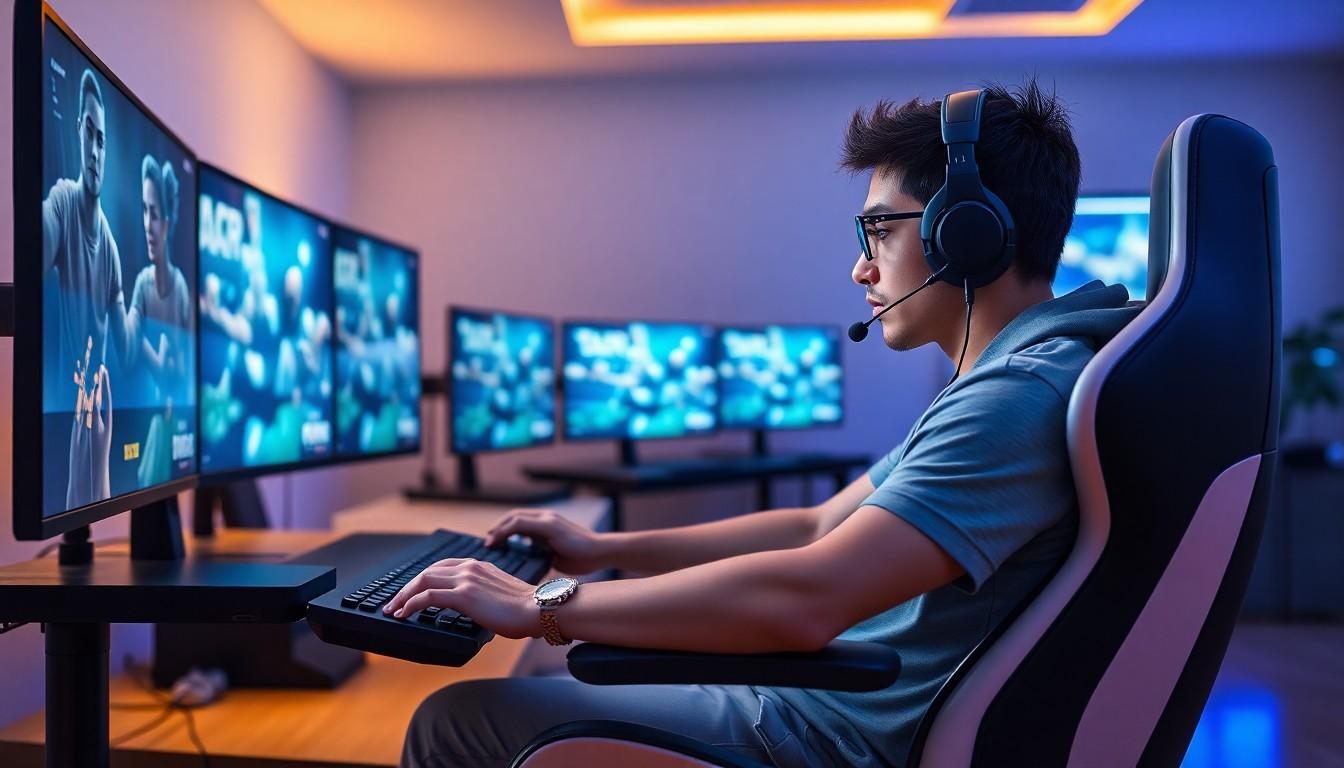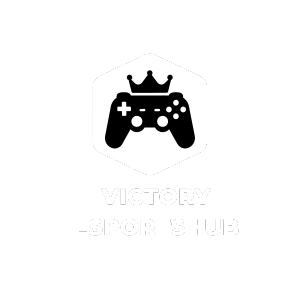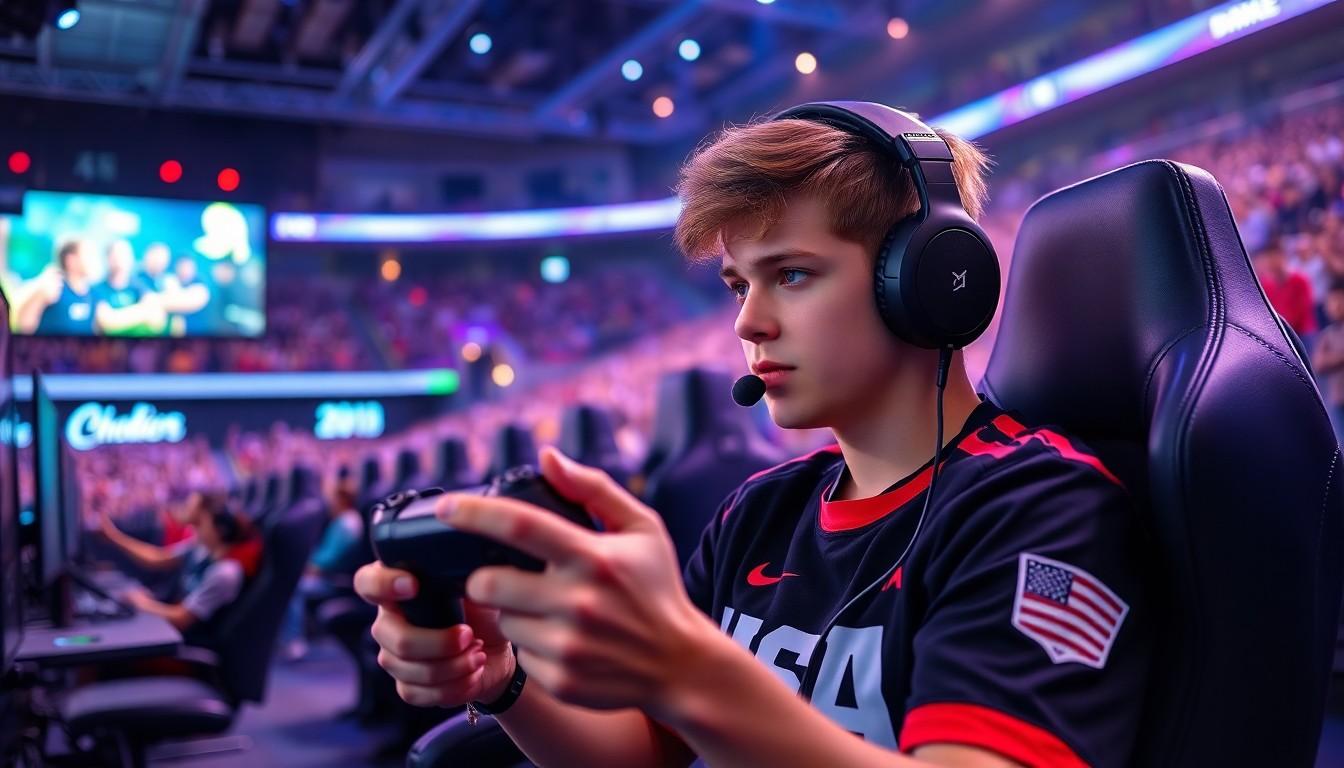In a world where gaming has evolved from a pastime to a full-blown profession, professional console gamers are leading the charge. These digital athletes aren’t just playing for fun; they’re racking up serious cash, fame, and a fanbase that rivals rock stars. Imagine trading your 9-to-5 grind for a life spent battling it out in virtual arenas—sounds like a dream, right?
Overview of Professional Console Gamers
Professional console gamers, often termed digital athletes, compete in organized video game tournaments. These players demonstrate exceptional skills and strategic thinking in various games. Earning potential in this field has skyrocketed, with top players making millions through sponsorships and prize money.
Tournaments attract massive audiences, boosting the popularity of esports. Notably, games like Fortnite, Call of Duty, and FIFA witness fierce competition. Teams often form around these games, further professionalizing the scene. Many players invest time in practice, dedicating several hours daily to refine their skills.
Sponsorship deals enhance their earning potential, providing financial support and brand collaborations. Many brands recognize the influence of these gamers and partner with them for marketing campaigns. The rise of streaming platforms, such as Twitch and YouTube, allows players to showcase their skills and build significant followings.
Fan engagement plays a crucial role, as viewers interact with players during live streams. Fans contribute to the success and popularity of these gamers, creating dedicated communities. These communities often organize fan events and viewing parties, enriching the overall experience.
Esports organizations scout for talent, recruiting promising players to join their teams. They provide resources such as coaching and training facilities to enhance performance. Strategic partnerships with gaming hardware and software companies improve their competitive edge, allowing them to access the latest technology.
Players participate in league play, representing their teams in various championships and leagues. Each match serves as a step towards greater success, further establishing their reputation in the competitive gaming world.
Skills Required to Succeed

Professional console gamers must develop a specific set of skills to excel in competitive gaming. Mastery in various areas, including game knowledge and reflexes, enhances their performance on the digital battlefield.
Game Knowledge
Understanding game mechanics and strategies forms the foundation of successful gameplay. Familiarity with characters, weapons, and maps allows players to make informed decisions during matches. Knowledge of current meta trends keeps them ahead of competitors. Top players often analyze past tournaments to identify effective tactics. Engaging with community discussions helps them stay updated on changes and new content. Mastery of various games, such as Fortnite and FIFA, broadens their adaptability in different environments. Strategic thinking enables players to anticipate opponents’ movements and counter effectively.
Reflexes and Coordination
Exceptional reflexes and hand-eye coordination differentiate top players from the rest. Reaction times often dictate success in fast-paced games where milliseconds matter. Advanced coordination enables precise control over in-game actions, such as aiming and dodging. Practicing specific drills enhances muscle memory, leading to quicker responses. Gamers increasingly employ tools like aim trainers to refine their skills. Consistency in performance relies on the ability to maintain focus during long gaming sessions. Tournaments intensify the need for both mental and physical agility, pushing gamers to their limits.
The Competitive Scene
The landscape of competitive gaming has evolved significantly, showcasing the talents of professional console gamers at various levels. Gamers now aim for excellence through rigorous practice and dedication.
Major Tournaments
Major tournaments serve as the pinnacle of competitive gaming. Events like the Fortnite World Cup and the Call of Duty Championship attract thousands of participants and large audiences. Prize pools often exceed millions of dollars, providing immense motivation for players. Teams compete in front of live audiences and millions of online viewers, enhancing the excitement. These tournaments also feature fan engagement, with viewing parties organized globally to celebrate the events. Sponsorships and media coverage elevate the profile of these competitions, solidifying their importance in the esports ecosystem.
Popular Games
Popular games drive the competitive scene and capture the attention of gamers and fans alike. Titles such as Fortnite, Call of Duty, and FIFA dominate the esports landscape. Each game offers unique mechanics and engaging gameplay, fostering diverse competitive strategies. Players frequently adapt to changes in game updates and meta shifts, ensuring they remain competitive. Community events and online streaming platforms enhance the visibility of these games. Their popularity contributes to the growth of professional gaming, as new talents emerge to challenge established stars and inspire the next generation.
Training Regimens and Routines
Professional console gamers adopt diverse training regimens to enhance their performance. These routines encompass both physical fitness and mental preparation, vital components for achieving success in competitive gaming.
Physical Fitness
Physical fitness plays a crucial role in gaming performance. Regular workouts improve stamina and endurance, enabling players to engage in lengthy gaming sessions without fatigue. Aerobic exercises like running or cycling boost cardiovascular health, while strength training enhances muscular endurance. Flexibility exercises, such as yoga, contribute to injury prevention, allowing gamers to maintain long hours of practice. Nutrition also matters; players often follow balanced diets to sustain energy levels throughout the day. Staying hydrated remains essential, ensuring optimal concentration during competitions.
Mental Preparation
Mental preparation significantly influences player performance. Gamers engage in visualization techniques to envision successful gameplay, which enhances confidence. They also practice mindfulness and meditation to reduce stress and improve focus under pressure. Setting specific goals creates motivation, pushing them to strive for improvement continually. Incorporating strategy analysis into their routines helps players learn from past matches, refining their tactics. Rest and recovery are equally important, as adequate sleep fosters cognitive function, crucial for quick decision-making and reflexes during high-stakes tournaments.
Impact on Gaming Culture
Professional console gamers significantly shape gaming culture. They transform perceptions by elevating gaming from a recreational activity to a viable career. Major tournaments like the Fortnite World Cup and the Call of Duty Championship attract noteworthy attention. Significant prize pools often exceed millions of dollars, showcasing the financial potential within esports.
Fans engage actively with these events, creating vibrant communities around their favorite players and games. Watching these competitions feels akin to attending live sports events, fostering excitement and connection. Streaming platforms such as Twitch and YouTube amplify this engagement, allowing fans to follow and interact with gamers in real-time.
Community involvement becomes a hallmark of professional gaming. Gamers build loyalty through interactions during live streams, while viewing parties bring fans together globally. Esports organizations contribute by providing infrastructures, such as coaching and training facilities, ensuring players can excel.
Cultural shifts also arise as mainstream media embraces esports. Traditional sports networks frequently air competitive gaming events, showcasing the talent of professional players. This exposure solidifies gaming’s legitimacy as a career and an integral aspect of contemporary entertainment.
Skill development garners attention, influencing aspiring gamers. Training regimens emphasize physical fitness and mental preparation, showcasing the rigorous lifestyle required for success. Respect within the industry grows as players commit to improving their craft and pushing boundaries.
These changes cultivate a culture of respect and admiration for professional gamers. Community members celebrate those who dominate competitive play, amplifying admiration through social media. As games like Fortnite and FIFA evolve, they solidify their place within the broader cultural landscape.
Conclusion
The rise of professional console gamers marks a significant shift in the gaming landscape. They’ve transformed what was once a casual pastime into a respected and lucrative career. As digital athletes, these gamers showcase their skills on global stages, captivating audiences and building dedicated fanbases.
Their commitment to training and performance not only enhances their individual success but also elevates the entire esports community. With major tournaments and streaming platforms amplifying their reach, professional gamers are shaping the future of entertainment. This evolution underscores the importance of recognizing gaming as a legitimate career path, inspiring new generations to pursue their passion in the competitive gaming arena.

